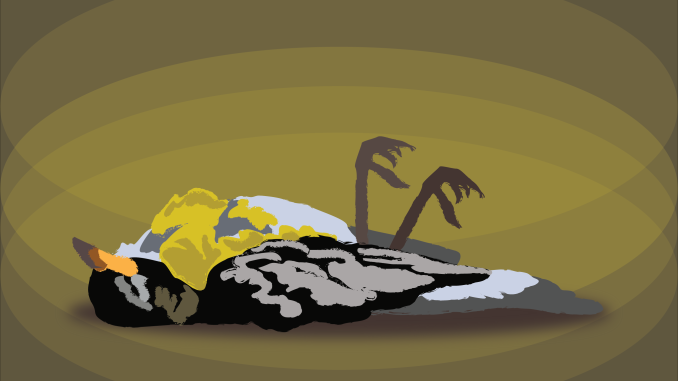
The City of Philadelphia is in the middle of a major migration route for birds and the region is home to more than 350 different species. From Aug. 15 through Nov. 15, millions of birds migrate over North America, and roughly 50,000 birds can fly over Philadelphia in one given night.
In 2019, between 100 and 200 birds died every year from flying into Main Campus buildings, said Glenn Eck, the associate director of grounds operations and facilities management. Since then, his team hasn’t been able to perform an in-depth count due to an increase in the Bird-Flu and the West Nile virus which can cause infection, wrote Eck in an email to The Temple News. They still believe numbers are roughly the same.
In October 2020, Bird Safe Philly, a joint program led and endorsed by the Academy of Natural Sciences of Drexel University, the City of Philadelphia’s Office of Sustainability and PECO, announced “Lights Out Philly,” an initiative that encourages businesses in Philadelphia to turn off their lights during peak migration season. By restricting light in buildings, especially during migration season, many birds’ lives can be saved, as they won’t be as attracted to the buildings.
Temple University must take a different approach. For safety reasons, Temple is required to have emergency lighting, which are controlled by motion sensors. Many birds’ lives can be spared if staff and students are proactive in shutting blinds in classrooms, office buildings and residence halls before dark.
During the day, most birds attempt to fly into windows that reflect the open sky, but most migrate at night and are attracted to buildings with lights on inside, which makes night-time bird window strikes more frequent than day strikes, said Rebecca Collins, Temple’s director of sustainability.
Birds are more likely to strike windows in major cities, like Philadelphia, because of the lights from inside and lights reflecting from other buildings, causing them to become disoriented by city light pollution. By closing the blinds in buildings that have windows, light is restricted to the inside.
At the Paley Building, Eck noticed a series of bird strikes all from the low-flying Yellow Warbler species. Eck has paid attention to the strikes since he started in his position and believes they’ve occurred since Paley was built in 1966.
Although Yellow Warblers weren’t consistently hitting other buildings, the birds routinely struck Paley, Eck said.
Birds can hit windows at any height, but most contractors don’t know if they’ll have a window-striking problem on a specific side of a building until it’s already built, according to the Massachusetts Audubon.
“The best solutions that we should be looking for are things we can retrofit under the existing structure after it’s built,” Eck said.
Hailey Hoisington, a junior at the Fox School of Business, has noticed dead birds along Broad Street and Susquehanna Avenue, by Johnson and Hardwick Hall.
“The deaths are heartbreaking because the birds don’t have anywhere else to go,” Hoisington. said. “They don’t know what time it is because of all of the lights, I always hear them at night.”
Housekeeping isn’t required to close blinds in buildings because only the program that occupies the building is allowed to implement the rule, wrote John Johnson, the assistant vice president of service operations and facilities management, in an email to The Temple News.
Shutting blinds could be a part of the community’s effort to help but adding it as a requirement in every building for the housekeeping staff would not be a viable solution. Housekeeping has thousands of square feet to clean every night, so requiring them to close blinds everywhere could present some challenges with time management, Johnson wrote.
“Buildings like Anderson and Gladfelter are offices, so you can ask your professors to close their blinds during migration season and students who are living in residence halls during migration season can lower their blinds too,” Collins said.
In academic buildings, if students are leaving a night class and see blinds open at night, they can take a few minutes to roll down blinds closest to them, as well as in student’s apartments and dorms.
During migration season, students should be proactive in shutting their blinds at night as well as encourage staff to roll down their blinds before leaving the classroom and office. These actions can help limit the number of window strikes during migration season.
This is not just Temple’s campus, but the home to hundreds of different bird species as well, and they deserve to fly about freely.



Be the first to comment